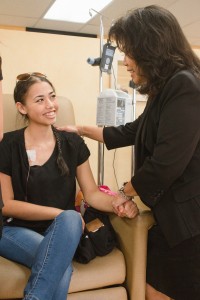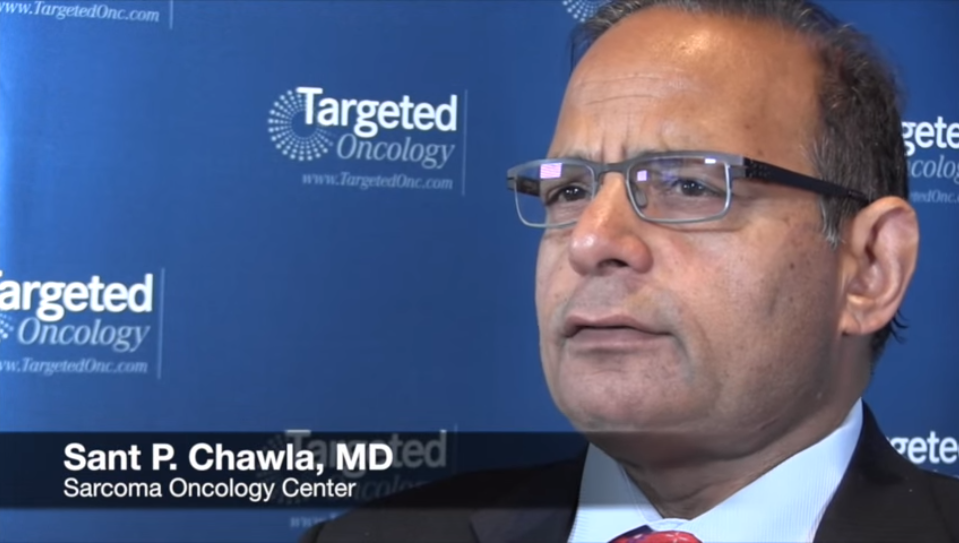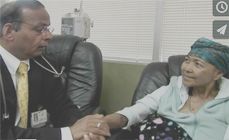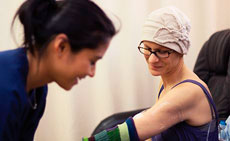“Courage doesn’t always roar. Sometimes courage is the little voice
at the end of the day that says, ‘I’ll try again tomorrow.’”
Mary Anne Radmacher, Author
Sarcomas of Uncertain Differentiation Explained
This is a family of subtypes that do not share any common cellular resemblance to other soft tissue sarcoma. For this reason, these sarcomas are combined into the “Uncertain Differentiation” subtype. This classification appears to affect adolescents and young adults more commonly than adults.
The subtypes categorized under Sarcomas of Uncertain Differentiation include:
Epithelioid Sarcoma – usually affects the extremities (arms and legs) and often travels to other sites of the body early in the disease’s onset. Epithelioid sarcoma most often develops in tissues under the skin of the hands, forearms, feet, or lower legs and it can travel to lymph nodes.
Epithelioid Sarcoma Patient Testimonial
Alveolar Soft Part Sarcoma – a rare cancer that typically occurs in the thigh or buttock. Men are more commonly affected by this cancer than women. It can travel very early to other sites of the body, including lung, chest cavity, liver, and bone, and occasionally to this brain.
Clear Cell Sarcoma – unusually rare tumor that shares features of both sarcoma and melanoma with the ability to travel to lymph nodes (typical of melanoma) and to lung (typical of sarcomas). It often develops in tendons of the arms or legs however origin of this cancer is unknown.
 Extraskeletal Myxoid Chondrosarcoma – second most primary bone cancer, it is cancer of cartilage cells. Growth rate is slow but it has a high risk of recurrence elsewhere in the body, such as the lung.
Extraskeletal Myxoid Chondrosarcoma – second most primary bone cancer, it is cancer of cartilage cells. Growth rate is slow but it has a high risk of recurrence elsewhere in the body, such as the lung.
PNET / Extra-Skeletal Ewing Sarcoma – Ewing’s Sarcoma that starts in a bone is the third most primary bone cancer; it can also originate in soft tissue and manifest anywhere in the body. In cases where the cancer recurs, it commonly shows up the lungs and bones.
Desmoplastic Small Round Cell Tumor – usually located in the abdominal cavity, it can move to other parts of the abdomen and pelvic area and spread further to the liver and lung.
The best strategy for early diagnosis is prompt attention to the signs and symptoms of this disease as well as knowing family medical history.
Patients recently diagnosed with sarcoma come to the Sarcoma Oncology Center because we are uniquely qualified to manage multi-modal treatment. Through our collaboration with pathologists, surgeons, radiologists, and radiation oncologists from other prestigious institutions, we can address the complexity of each case in its entirety.
We are intimately involved in our patients’ care and offer personal and individualized attention from the most renowned oncologists worldwide.
Symptoms of Uncertain Differentiation Sarcomas
Similar to other sarcoma subtypes, this classification does not manifest noticeable symptoms until it’s reached a more advanced stage or spread to another part of the body. A general symptom of cancer overall can includes weight loss and fatigue. If the cancer starts or spreads to internal organs, symptoms would include swelling and tenderness in the area and the affected organ could have problems. For example, a tumor that either starts or spread to the lung might cause breathing difficulty.
A variety of this sarcoma that starts in the bones could put pressure on nerves, which would then cause feelings of numbness, tingling and/or even muscle weakness.
These symptoms are often due to conditions other than cancer; for example, children incur playing field injuries while adults develop arthritis. However, if any physical problem continues for a prolonged time without any known reason, a doctor should be consulted.
Treatment for Uncertain Differentiation Sarcomas
Sarcomas are a complex form of cancer and the Sarcoma Oncology Center considers many factors when developing the most effective course of treatment for our patients. We consider the grade and stage of the tumor, prior treatments (if any), progress of the cancer, biopsy analysis and other individualized factors. We work in collaboration with prominent surgeons, pathologists and radiation oncologists from prestigious institutions such as M.D. Anderson, St. John’s, Cedars Sinai, Stanford, UCLA, and USC. Together we create personalized multi-modality treatment plans with the capacity to go beyond standard cancer care.
Sarcoma Oncology Center is a leader in sarcoma research with access to the most advanced cancer drugs. As leaders in sarcoma research worldwide, our oncologists are pioneers of cutting edge sarcoma clinical research trials in which some of our patients have participated.
To learn more about sarcoma cancer treatment, visit WebMD.com.
Clinical Trials at Sarcoma Oncology Center
At the Sarcoma Oncology Center, our expert oncologists are actively involved in clinical trials of the newest drugs and we work with a team of experts to develop the best treatment plan for each patient.
Dr. Chawla is the international principal investigator of Regorafenib (Stivarga, SARCO24) which is currently undergoing clinical trials in the United States.
Contact the Sarcoma Experts for More Information
Sarcoma Oncology Center considers the physical and emotional well-being of each individual and provides an expert team of medical specialists. Center oncologists are actively involved in clinical trials of the newest drugs and work as a team to develop the best individual treatment plan. Please contact our center at 310-552-9999 to schedule a consultation with one of our physicians.
Next, read about liposarcoma cancer treatment.





